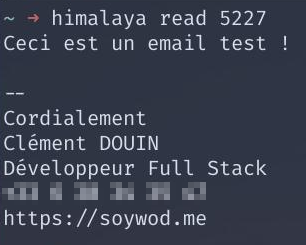| .github | ||
| src | ||
| .gitignore | ||
| Cargo.lock | ||
| Cargo.toml | ||
| CHANGELOG.md | ||
| install.sh | ||
| LICENSE | ||
| README.md | ||
📫 Himalaya 
Minimalist CLI email client, written in Rust.
Table of contents
Motivation
Bringing emails to the terminal is a pain. The mainstream TUI, (neo)mutt, takes time to configure. The default mapping is not intuitive when coming from the Vim environment. It is even scary to use at the beginning, since you are dealing with sensitive data!
The aim of Himalaya is to extract the email logic into a simple (yet solid) CLI API that can be used either directly from the terminal or UIs. It gives users more flexibility.
Installation
curl -sSL https://raw.githubusercontent.com/soywod/himalaya/master/install.sh | bash
See the wiki section for other installation methods.
Configuration
# ~/.config/himalaya/config.toml
name = "Your full name"
downloads-dir = "/abs/path/to/downloads"
[gmail]
default = true
email = "your.email@gmail.com"
imap-host = "imap.gmail.com"
imap-port = 993
imap-login = "your.email@gmail.com"
imap-passwd-cmd = "pass show gmail"
smtp-host = "smtp.gmail.com"
smtp-port = 487
smtp-login = "your.email@gmail.com"
smtp-passwd-cmd = "security find-internet-password -gs gmail -w"
See the wiki section for all the options.
Usage
Himalaya 0.2.0
soywod <clement.douin@posteo.net>
📫 Minimalist CLI email client
USAGE:
himalaya [OPTIONS] [SUBCOMMAND]
FLAGS:
-h, --help Prints help information
-V, --version Prints version information
OPTIONS:
-a, --account <STRING> Name of the account to use
-o, --output <STRING> Format of the output to print [possible values: text, json]
SUBCOMMANDS:
attachments Downloads all attachments from an email
forward Forwards an email
help Prints this message or the help of the given subcommand(s)
idle Starts the idle mode
list Lists emails sorted by arrival date
mailboxes Lists all available mailboxes
read Reads text bodies of an email
reply Answers to an email
save Saves a raw message in the given mailbox
search Lists emails matching the given IMAP query
send Sends a raw message
template Generates a message template
write Writes a new email
See the wiki section for more information about commands.
List mailboxes
Shows mailboxes in a basic table.
List messages
Shows messages in a basic table.
Search messages
Shows filtered messages in a basic table. The query should follow the RFC-3501.
Download attachments
Downloads all attachments from a message directly to the
downloads-dir.
Read a message
Shows the text content of a message (text/plain if exists, otherwise
text/html).
Write a new message
himalaya write
Opens your default editor (from the $EDITOR environment variable) to compose
a new message.
Reply to a message
himalaya reply --all 5123
Opens your default editor to reply to a message.
Forward a message
himalaya forward 5123
Opens your default editor to forward a message.
Listen to new messages
himalaya idle
Starts a session in idle mode (blocking). When a new message arrives, it runs
the command notify-cmd defined in the config
file.
Here a use case with systemd:
# ~/.config/systemd/user/himalaya.service
[Unit]
Description=Himalaya new messages notifier
[Service]
ExecStart=/usr/local/bin/himalaya idle
Restart=always
RestartSec=5
[Install]
WantedBy=multi-user.target
systemctl --user enable himalaya.service
systemctl --user start himalaya.service
Credits
- IMAP RFC3501
- Iris, the himalaya predecessor
- isync, an email synchronizer for offline usage
- NeoMutt, an email terminal user interface
- Alpine, an other email terminal user interface
- mutt-wizard, a tool over NeoMutt and isync
- rust-imap, a rust IMAP lib




